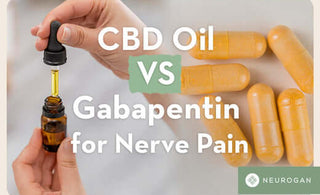CBD oil and Gabapentin come up a lot in conversations about managing nerve pain. They work very differently, so you might wonder which route you should choose.
Both options offer unique potential benefits, but one may align more with your overall wellness goals.
CBD Oil vs. Gabapentin
Gabapentin is a medication typically prescribed for nerve conditions, such as restless leg syndrome, partial seizures, and general nerve pain. It’s in a group of medicines called anticonvulsants. There are different versions of Gabapentin, and they aren’t interchangeable, so you’ll be prescribed the best version for your condition.
Gabapentin is said to work for nerve pain and related conditions through a few channels. It inhibits excitatory neurons, meaning it blocks specific signals from nerves, reducing activity and preventing the spread of abnormal electrical charges in the brain, which could contribute to seizures.

It also modulates the activity of glutamic acid decarboxylase (GAD), which makes GABA a neurotransmitter that slows brain activity. This could potentially help with its anticonvulsant properties. GABA interacts with other neurotransmitters, such as glutamate, dopamine, and others, but more research is needed to know exactly the impact these interactions have.
As we said, Gabapentin is a prescription medication, so you have to have to speak with your healthcare provider for access. There are also higher risks involved when taking Gabapentin compared to an over-the-counter pain killer.
CBD, on the other hand, is a natural compound that comes from the hemp plant. It works with the ECS to support the body’s natural responses to pain and inflammation, which studies suggest may potentially ease nerve-related discomfort [1].
Even with this research, CBD isn’t approved to treat nerve pain. Despite this, many people find relief when using CBD, both topically and internally, to manage pain. Plus, its affordability and accessibility is a huge draw for consumers.
There is one FDA-approved CBD medication for seizures: Epilodex, which is prescribed to treat specific seizures like Dravet Syndrome and Lennox-Gastaut Syndrome [2]. This medication could reduce seizures by up to 50% in some patients [2].
Which is Better for Nerve Pain?
Gabapentin and CBD work on different mechanisms. Gabapentin addresses nerve pain more directly, and CBD oil helps to balance systems in the body that manage pain and inflammation, which can be beneficial for both nerve and chronic back pain, creating a more holistic approach

Whether CBD or Gabapentin is better for nerve pain completely depends on the individual’s circumstances, and we can’t really recommend which will work best. It’s a good idea to speak with a healthcare professional who can take your health history and current lifestyle into consideration when it comes to creating a treatment plan.
That being said, there are many people including seniors who have opted for a more natural route when managing their pain symptoms and will use high potency CBD oil in conjunction with other traditional forms of pain management. Applying it topically to the site of pain or taking capsules, oil, or gummies internally seems to work well for people.
Does CBD Work for Neuropathy?
There are people who use CBD for neuropathy, but it doesn’t work well for everyone.
In a phase II trial, some users report reduced pain and discomfort from conditions like diabetic neuropathy and other forms of nerve pain when using CBD oil [3]. However, the effectiveness can vary based on the individual and the severity of their symptoms.
Can You Use CBD and Gabapentin Together?
You technically can use CBD and Gabapentin together, but don’t do it without the green light from your healthcare professional, as CBD may affect your Gabapentin dosage.

These two compounds target nerve pain differently, so combining them might offer complementary benefits. CBD could amplify Gabapentin's sedative effects, especially in higher doses, resulting in drowsiness, dizziness, or fatigue. Taking CBD oil at night or when you're at home may be the best time for you.
Alternatives to Gabapentin
If Gabapentin isn’t suitable, some other supplements and cannabinoids may offer support for nerve pain:
Gabapentin Alternatives:
- Cannabigerol: CBG is known as the “mother of all cannabinoids.” CBG may support nerve health [4]. It’s sought out as a natural option for managing discomfort without the potential drowsiness associated with CBD at higher doses.
- Alpha-Lipoic Acid: a potent antioxidant supplement that may help reduce neuropathy symptoms, especially in people with diabetes.
Turmeric (Curcumin): A natural anti-inflammatory herb, turmeric may help relieve nerve pain by supporting the body’s natural inflammatory response and oxidative stress. Magnesium: Deficiencies in magnesium have been linked to increased nerve pain, and supplementation may help alleviate symptoms.
So which is better? CBD Oil vs Gabapentin
Nerve pain is famously difficult to treat. Gabapentin, as a prescription medication, is well-established for treating neuropathic pain but may cause significant side effects in some individuals. On the other hand, CBD oil, though promising and widely used for pain relief, lacks comprehensive clinical trials to fully substantiate its efficacy and safety.
Ultimately, the choice between a CBD oil and gabapentin should be made in consultation with a healthcare provider, considering the individual's specific needs, potential benefits, and risks.
References:
- Xu, D. H., Cullen, B. D., Tang, M., & Fang, Y. (2020). The effectiveness of topical cannabidiol oil in symptomatic relief of peripheral neuropathy of the lower extremities. Current pharmaceutical biotechnology, 21(5), 390-402.
- Sekar, K., & Pack, A. (2019). Epidiolex as adjunct therapy for treatment of refractory epilepsy: a comprehensive review with a focus on adverse effects. F1000Research, 8.
- Balfour, H. (2014, May 14). CBD tablet significantly improves diabetic peripheral neuropathic pain [Review of CBD tablet significantly improves diabetic peripheral neuropathic pain]. European Pharmaceutical Review. CBD tablet significantly improves diabetic peripheral neuropathic pain.
- Sepulveda, D. E., Morris, D. P., Raup‐Konsavage, W. M., Sun, D., Vrana, K. E., & Graziane, N. M. (2022). Cannabigerol (CBG) attenuates mechanical hypersensitivity elicited by chemotherapy‐induced peripheral neuropathy. European Journal of Pain, 26(9), 1950-1966.


